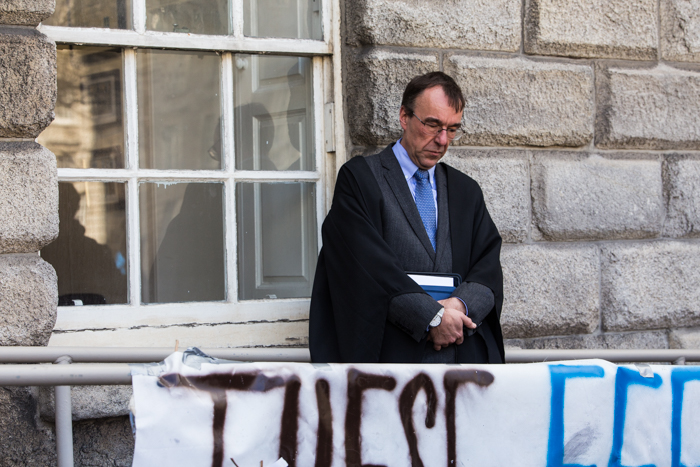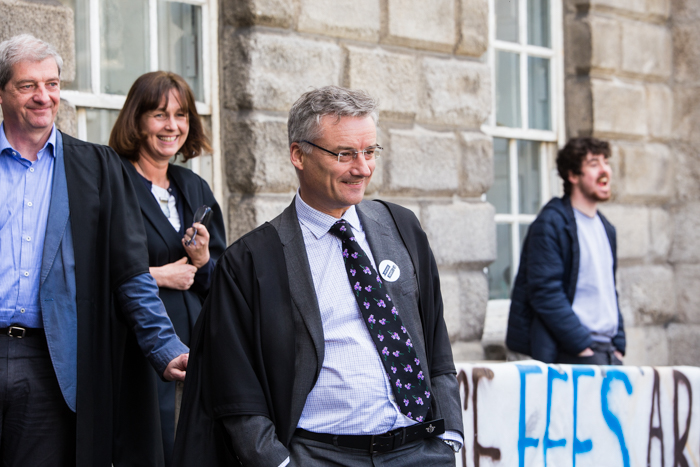Supplemental exam fees have been scrapped, in the face of historic levels of student anger and opposition, following a decision of the College Board today.
Provost Patrick Prendergast announced the decision on Twitter following this morning’s meeting of the College Board.
Trinity will also introduce fee certainty for international undergraduate students and postgraduate students. All student proposals were approved today.
Speaking outside House One, Trinity College Dublin Students’ Union (TCDSU) President Kevin Keane said: “We’re here today because politicians in Leinster House have failed to take action.”
“I just want to say that I’m extraordinarily proud of you all. This is and likely will be the most important movement I’ve been a part of.” Keane thanked Prendergast and College for meeting with students.
The decision is historic. Through sheer force of protest and anger, students have forced Trinity into an embarrassing backtrack. Only weeks ago, Vice-Provost Chris Morash had suggested student anger was misguided. Today, Trinity’s senior management acquiesced in the face of a protest that attracted national attention and drew widespread criticism of College.
Chants outside House One began at 12pm this afternoon. “Take back Trinity” has becoming a rallying crying across campus in recent weeks, as anger grew rapidly following College’s now infamous decision to introduce a €450 flat fee for supplemental exams.
In a press statement, released following the decision, Provost Patrick Prendergast said: “I undertook that we would seriously consider alternative proposals, and we have done so.”
“I look forward to continuing the dialogue with student representatives to find a solution to the issues confronting Irish higher education, taking account of both fairness to all students and the College’s financial position. I would like to thank everyone who has contributed so far.”
The announcement was greeted with jubilation in Front Square. Trinity, with its rigid bureaucratic structure, doesn’t reverse on Board decisions lightly. Today’s decision, while presented by College as a renewal of student partnership, will be a source of embarrassment for a senior management that is used to getting its own way.
“We have managed to go from defeat to total victory in three weeks”, Graduates Students’ Union (GSU) President-elect Oisín Vince Coulter told students following the announcement.
There was little sense that College’s decision will mitigate wider student anger towards the commercialisation and cost-cutting that have become the norm in Trinity and the wider third-level sector. “This doesn’t end here”, Coulter said.
“We must make sure this goes national and support other colleges who are protesting as well”, Take Back Trinity campaign member and TCDSU Disabilities Officer Laura Beston told the crowd. “We can celebrate now, but we must remember what we started with”, she said.
“It was never just about fees. We want a democratic academic community”, Conchúir Ó Raidaigh, a prominent campaign member, told students.

TCDSU came to the meeting this morning with a number of key demands. A proposal submitted to Board by Trinity College Dublin Students’ Union (TCDSU), seen by The University Times, asked College to approve a number of reforms. It asked Trinity to scrap supplemental exam fees, returning Trinity to a system of no fees and no modular billing.
Board also approved the creation of a Modular Billing Working Group, which would include five student representatives, including the TCDSU President and the GSU President, the Dean of Students, the Senior Lecturer, the Dean of Graduate Studies and the Vice-Provost, Chris Morash.
College, in defending supplemental exam fees to students, argued that it had little choice if it was to cover the cost of modular billing. TCDSU proposed that the introduction of modular billing is deferred until 2020/2021, “in order to facilitate a full and detailed analysis of all potential streams of revenue to fund it”.
The proposal also stated that “supplemental re-assessment charges not be considered as a preferred stream of revenue for the funding of modular billing for repeating students”. It also noted that supplemental exam fees will not be considered in any form “prior to the bona fide exploration of alternative revenue streams to fund modular billing”.
If a funding model for modular billing cannot be reached, the proposal states, TCDSU will “commit to facilitating a broad and comprehensive consultation with the entire student body”.
There has been an element of Trinity being embarrassed into action. In documents submitted to the College Board ahead of today’s meeting, seen by The University Times, Trinity’s Chief Financial Officer Ian Mathews warned that not introducing fee certainty – another key campaign demand – could result in damage to Trinity’s reputation. However, he also warned Board members that introducing fee certainty for postgraduate and non-EU students – a freeze on fees for current students – would wipe €2.6 million from College’s projected earnings.
Last week, Provost Patrick Prendergast made the rare decision to meet with TCDSU and the GSU in House Six, following huge student anger at a botched shutdown of the occupation of the Dining Hall. He asked students for patiences as College negotiated on the issue of supplemental exam fees.
Former asylum seeker and spokesperson for the Movement of Asylum Seekers in Ireland Lucky Khambule spoke to the crowd protesting outside today: “As long as you are united as you are, the power is with you.”
Brid Smith, a People Before Profit TD, told students gathered that Trinity is trying to turn the university “into an industrial complex” and added that “this is a class issue”.
“You’re doing it for the future. You have to end the scandal”, Smith continued. “Divided we are weaker. Together we are stronger.”
Also speaking today was Paul Murphy, a Solidarity TD. He told students that today “shows your power” and that the protests “dragged them to the negotiating table. It forced them to engage with you”.
“It is immensely inspirational coming to the protest the last couple of weeks”, Murphy said. “If we fight, we can win. That is a very powerful lesson that they don’t want people to learn.”
Kathleen McNamee and Ciaran Molloy also contributed reporting to this piece.







